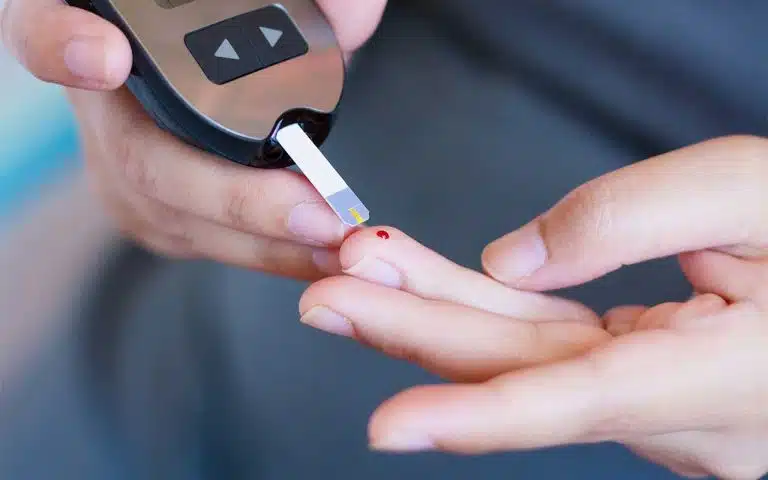Cocaine is an addictive recreational drug that is often used for its euphoric effects. However, cocaine can have many dangerous health effects on the brain and body. Cocaine can be particularly dangerous for people with medical complications, like diabetes.
Diabetes and cocaine are both risk factors for cardiovascular problems, like heart attack and stroke. Cocaine abuse can also affect blood glucose levels and proper diabetes care, including insulin management.
Effects Of Cocaine Use
Cocaine is an illicit drug that causes short-lived but powerful effects, which may lead to frequent binges.
Once it reaches the brain, cocaine binds to dopamine receptors. Dopamine is a chemical associated with pleasure and reward. Binding to these receptors causes increased levels of dopamine in the body.
This can cause a rush of euphoria and happiness along with increased energy and alertness.
Other side-effects of cocaine may include:
- anxiety
- paranoia
- constricted blood vessels
- restlessness
- tremors
- high body temperature
- rapid or irregular heartbeat
- increased blood pressure
High amounts of cocaine can severely impact the cardiovascular system, including heart attack, stroke, or seizure.
Cocaine & Diabetes
Diabetes mellitus is a metabolic disease that causes high glucose (sugar) levels. In addition, the pancreas doesn’t make enough insulin, which is a hormone your body uses to process glucose. Diabetics require prescription insulin to maintain healthy glucose levels.
Diabetes can also cause hypertension (high blood pressure) and when combined with cocaine, increases the risk of heart attack and stroke.
People with diabetes who also use cocaine may experience:
- irregular eating and sleeping patterns
- hypoglycemia (low blood sugar)
- hyperglycemia (high blood sugar)
- forgetting to take insulin
- increased risk of diabetic ketoacidosis (DKA)
Stimulants like cocaine can suppress your appetite and increase energy levels. Frequent substance abuse can lead to poor nutrition and a lack of sleep. This can cause negative consequences for healthy individuals but can cause dangerously low blood sugar levels in diabetics.
The use of cocaine can also impair judgment, which can affect your ability to manage carbohydrates and take insulin properly. Insulin is an important part of diabetes care that helps control blood sugar. Without regular insulin doses, diabetics can become hyperglycemic.
Diabetic Ketoacidosis (DKA)
Glucose is used as an important fuel source for cells in your body. When insulin is neglected, it can prevent glucose from being used as a fuel source.
Instead, the body starts breaking down fat at an excessive rate, causing a condition known as diabetic ketoacidosis (DKA). The liver turns the fat into a new fuel source, called ketones, which causes the blood to become acidic.
DKA can become life-threatening if untreated. Several noticeable symptoms may occur with DKA, including:
- rapid breathing
- flushed face
- fruity-smelling breath
- frequent urination
- decreased alertness
DKA normally occurs in people with Type 1 diabetes but can also affect people with Type 2 diabetes. The risk of experiencing DKA is increased when you use drugs, especially cocaine.
DKA & Cocaine Use
According to the National Library of Medicine, the prevalence of DKA is higher among people who use cocaine more than other drugs.
When you use cocaine, you may forget to take insulin, which can lead to high blood sugar levels. High blood sugar, or hyperglycemia, is a risk factor for DKA in diabetics.
It may also be influenced by the excess production of counterregulatory hormones that prohibit the action of insulin. These include the hormones norepinephrine and epinephrine, which are increased in the body with cocaine use.
Cocaine Addiction Treatment
Drug use issues can affect every area of your life and can further complicate medical conditions. If you or a loved one is a diabetic, it is important to seek treatment for cocaine addiction.
Treatment facilities give you access to qualified healthcare professionals, positive peer support, and other treatment services.
A clinician will likely develop an individualized treatment plan that may include:
- detox, which will help you during the difficult withdrawal process
- inpatient rehab, which provides 24/7 supervision and a highly structured environment
- outpatient program, which allows you to commute to scheduled treatment sessions
- behavioral therapy, which will help you learn to cope with cravings and triggers
- peer support groups, like the 12-step program Narcotics Anonymous (NA)
- holistic activities, like yoga and meditation
If you or a loved one would like more information about cocaine addiction treatment, please contact us today.
Written by Ark Behavioral Health Editorial Team
©2024 Ark National Holdings, LLC. | All Rights Reserved.
This page does not provide medical advice.
National Library Of Medicine - The Effects of Substance Abuse on Blood Glucose Parameters in Patients with Diabetes: A Systematic Review and Meta-Analysis
National Diabetes Services Scheme (NDSS) - Drug Use And Diabetes Type 1 Booklet
National Institute On Drug Abuse (NIDA) - Cocaine DrugFacts
National Library of Medicine: MedlinePlus - Diabetic Ketoacidosis
PubMed - Diabetic Ketoacidosis Associated With Cocaine Use

Questions About Treatment?
Ark Behavioral Health offers 100% confidential substance abuse assessment and treatment placement tailored to your individual needs. Achieve long-term recovery.
100% confidential. We respect your privacy.
Prefer Texting?
Our friendly support team is here to chat 24/7. Opt out any time.








 Learn More
Learn More








